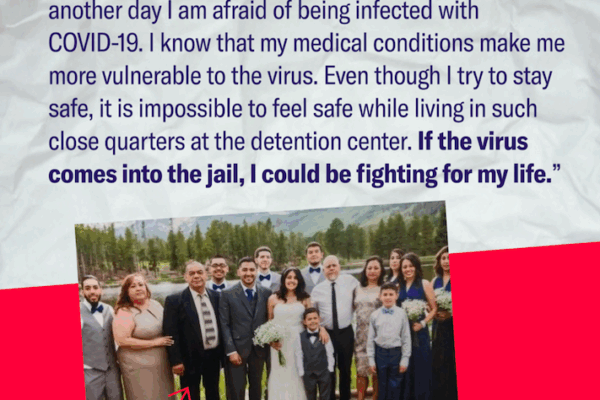Joaquin Herrera-Herrera, a 60-year-old man detained by ICE on pending immigration proceedings since February, yesterday asked a federal court to release him from the Jerome Combs Detention Center (JCDC) in Kankakee because his age and underlying health conditions make him vulnerable to serious complications and death from COVID-19. Mr. Herrera-Herrera came to the United States at age six, and has resided in the Chicago area for almost his entire life. As a business owner, he placed and serviced vending machines in restaurants and medical offices for decades, providing for his three children and – before his detention – acting as caregiver for his grandson for more than six years.
Mr. Herrera-Herrera has been diagnosed with hypertension and is a survivor of prostate cancer.
“Every day that I have been held at Kankakee is another day I am afraid of being infected with COVID-19,” Mr. Herrera-Herrera said in a statement. “I know that my medical conditions make me more vulnerable to the virus. Even though I try to stay safe, it is impossible to feel safe while living in such close quarters at the detention center. If the virus comes into the jail, I could be fighting for my life.”
“Mr. Herrera-Herrera faces a high risk of severe illness and death from COVID-19 because of his underlying health conditions,” said Nusrat Jahan Choudhury, legal director at the ACLU of Illinois. “Two federal judges have already ordered the release of medically vulnerable ICE detainees from the Jerome Combs Detention Center because the facility presents an increased danger from the spread of COVID-19. The detention of Mr. Herrera-Herrera in these conditions recklessly endangers his life in violation of basic principles of fairness and protection from cruel punishment. The court should release him immediately.”
The complaint filed today references an expert study showing that once coronavirus enters a facility approximate the same size to JCDC, coronavirus will infect as many as 88% of the detainees in 30 days, and accelerate to infecting nearly all (99%) of detainees within 90 days.
"For months, public health experts have warned that COVID-19 would spread rapidly within ICE detention facilities, with a devastating effect on the people detained, staff who work at the facilities, and their communities," said Eunice Cho, senior staff attorney at the ACLU's National Prison Project.
"Last week, the first known death from COVID-19 in ICE custody was reported. Civil immigrant detention should not be a death sentence, but for our clients — who have underlying medical conditions and other risk factors — a COVID-19 infection likely would be. We urge the court to step in and take immediate action to mitigate the humanitarian crisis we're facing."
As described today, conditions at JCDC foster the spread of COVID-19. Mr. Herrera-Herrera shares a small cell with another detainee. For much of his detention, he shared the cell with 3 other men, one of whom would have to step on Mr. Herrera-Herrera’s mattress to access a top bunk.
In addition, detainees spend most of their days in a common area with more than 20 other men. Those detained spend the day gathered around five tables, each with eight stools that sit inches apart from one another. They share other equipment throughout the day – phones, chairs, books, and others – that are not sanitized after every use. Even spending most of his day in his cells, Mr. Herrera-Herrera must touch some of these same surfaces on a regular basis.
Perhaps most important, Mr. Herrera-Herrera must stand in line several times a day to receive meals and medication with little distance between him and the other detainees.
“Mr. Herrera-Herrera is frightened,” added the ACLU’s Choudhury. “He is fearful that his pre-existing conditions will result in his becoming infected with dire, even deadly, consequences. We will urge the court to release him as soon as possible.”

